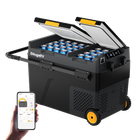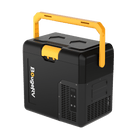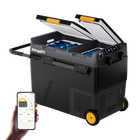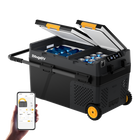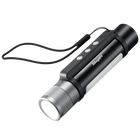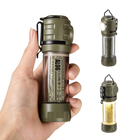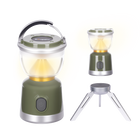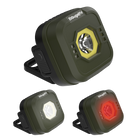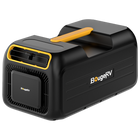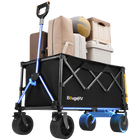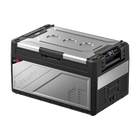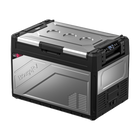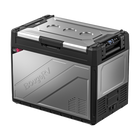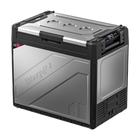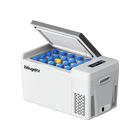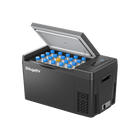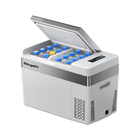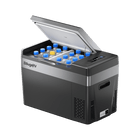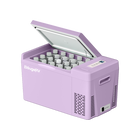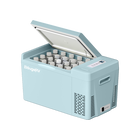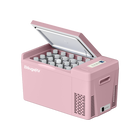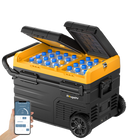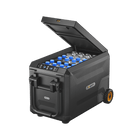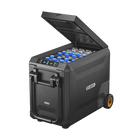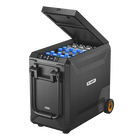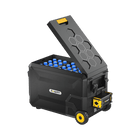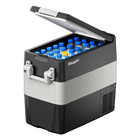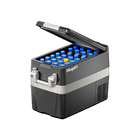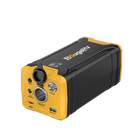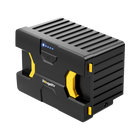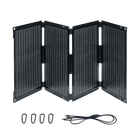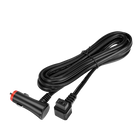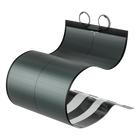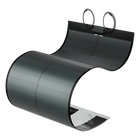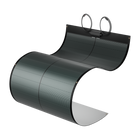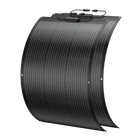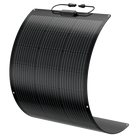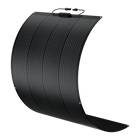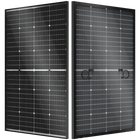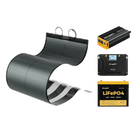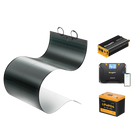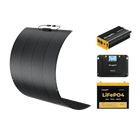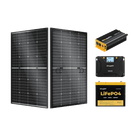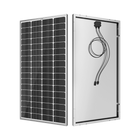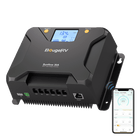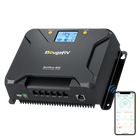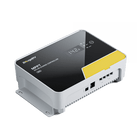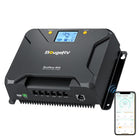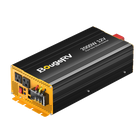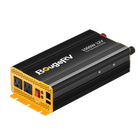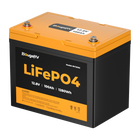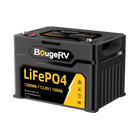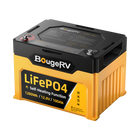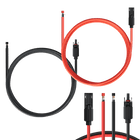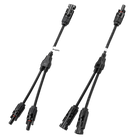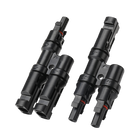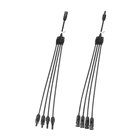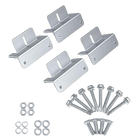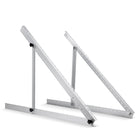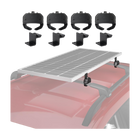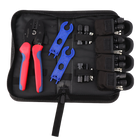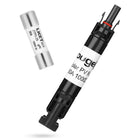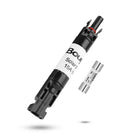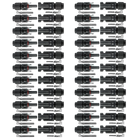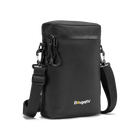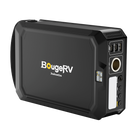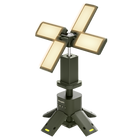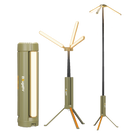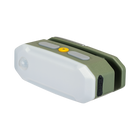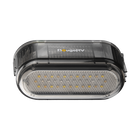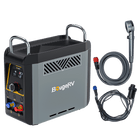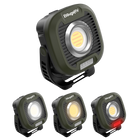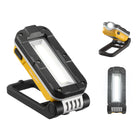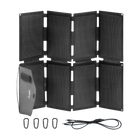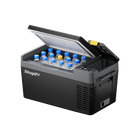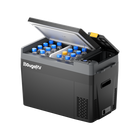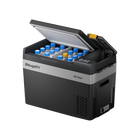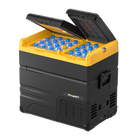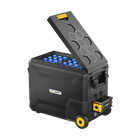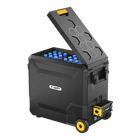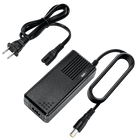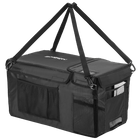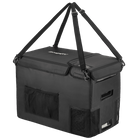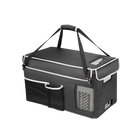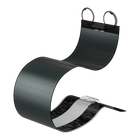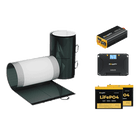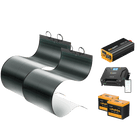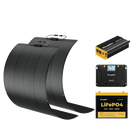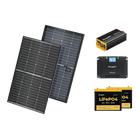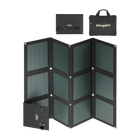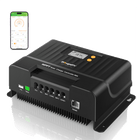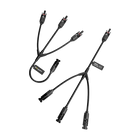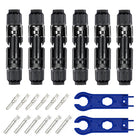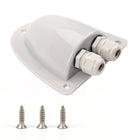Do Solar Panels Work at Night?

If you’ve ever marveled at the power of solar panels during the day, you might have wondered: Do solar panels work at night? And if they don't, how can you ensure your camping trip or off-grid tiny house stays powered 24/7?
In this blog, we’ll explore how solar panels work, whether they can generate electricity at night, and how you can keep your devices and appliances running smoothly after the sun sets. Whether you’re a weekend camper or living the off-grid tiny house dream, this guide will help you make the most of your solar power system.
How Do Solar Panels Work?
Let’s start with the basics. Solar panels, like the ones we offer here at BougeRV, are made up of photovoltaic (PV) cells. These cells absorb sunlight and convert it into direct current (DC) electricity. This electricity then flows through an inverter, which transforms it into alternating current (AC) electricity that can power your devices and appliances.
But here’s the key: solar panels need sunlight to generate electricity. Without sunlight, there’s no energy for the PV cells to convert.
Do Solar Panels Work at Night?
The short answer is no, solar panels don’t produce electricity at night. Since they rely on sunlight, they go into a kind of "sleep mode" after the sun sets. But don’t worry—this doesn’t mean you’ll be left in the dark!
Although your solar panels stop producing electricity at night, they remain an integral part of your power system. Here’s what happens during this time:
-
Standby Mode: Your panels essentially "rest" and prepare to resume energy production when the sun rises.
-
Energy Storage Kicks In: If you’ve paired your panels with a solar battery or portable power station, the energy they generate during the day is stored and ready for use at night.
-
Grid Connection (Optional): For grid-tied systems, you can draw electricity from the grid at night if your stored energy runs out.
How to Power Your Devices and Appliances at Night
Solar panels are just one part of a complete solar power system. While your solar panels may not produce power at night, there are several solutions to ensure you still have electricity when the sun isn’t shining. Let’s dive into these options.
1. Solar Batteries: Store the Sun for Later

Solar batteries are the most popular solution for nighttime power. During the day, your solar panels generate electricity, and any excess energy is stored in the battery. At night, you can draw power from the battery to keep your devices running.
For campers and off-grid tiny house owners, solar batteries are a game-changer. They allow you to enjoy the benefits of solar energy even when the sun isn’t shining. Modern solar batteries, like lithium-ion models, are lightweight, durable, and capable of storing enough energy to power everything from your phone to your mini-fridge.
Pro Tip: When choosing a solar battery, consider your energy needs. If you’re running multiple appliances, you’ll need a battery with a higher capacity.
2. Portable Power Stations: A Flexible Backup Solution

If you’re looking for a versatile and portable option, a solar-compatible power station is a great choice. These devices combine a battery, an inverter, and multiple charging ports in one compact unit. You can charge them with your solar panels during the day and use them to power your devices at night.
Portable power stations are especially handy for campers who need a lightweight and easy-to-carry solution. They’re also perfect for tiny house owners who want a plug-and-play backup system.
3. Generator Backup: For Extra Peace of Mind
While solar batteries and power stations are excellent for most situations, some people like to have a generator as a backup, especially if they’re in an area with limited sunlight. A generator can provide reliable power during extended cloudy periods or in emergencies.
However, generators rely on fuel (like gas or propane) and aren’t as eco-friendly as solar solutions. If you’re committed to sustainable living, you’ll likely want to prioritize solar batteries and power stations.
Do Solar Panels Work on Cloudy Days?
It’s not just nighttime that can impact your solar panels—cloudy days can also reduce their efficiency. But don’t worry, solar panels still work on cloudy days, just at a lower capacity. Depending on the thickness of the clouds, your panels might produce anywhere from 10% to 50% of their usual output.
This is why energy storage is so important. By storing excess energy on sunny days, you’ll have a reserve to draw from during cloudy weather or at night.
If you are looking for more information, please click the link below:
Do Solar Panels Work on Cloudy Days?
Tips for Optimizing Your Solar Power System

To get the most out of your solar panels, follow these simple tips:
-
Position Your Panels Correctly: Aim your panels toward the sun and adjust their angle based on your location and the season.
-
Keep Them Clean: Dust, dirt, and debris can reduce your panels’ efficiency. Clean them regularly to ensure optimal performance.
-
Monitor Your Energy Usage: Be mindful of how much energy you’re using, especially at night. Prioritize essential devices and appliances to make your stored energy last longer.
-
Invest in High-Quality Equipment: Quality matters when it comes to solar power. Our BougeRV solar panels are designed to deliver reliable performance, even in challenging conditions.
Conclusion
While solar panels don’t work at night, they’re still a fantastic solution for powering your camping trips and off-grid tiny house. By pairing your panels with a solar battery or portable power station, you can enjoy clean, renewable energy 24/7.
At BougeRV, we’re passionate about helping you embrace the power of the sun. Whether you’re setting up a tiny house in the mountains or embarking on your next camping adventure, our high-quality solar panels and accessories are here to keep you powered up and ready for anything.
So, go ahead—embrace the freedom of solar power and enjoy the great outdoors without worrying about losing power when the sun goes down. Happy adventuring!
FAQs
1. What happens to the unused energy generated during the day?
During the day, if your solar panels generate more electricity than you need, the excess energy can be stored in a solar battery or a portable power station. This stored energy can then be used at night or during cloudy periods when the panels are less efficient.
2. How long do solar batteries last?
Modern solar batteries, especially lithium-ion models, typically last 10 to 15 years or even longer, depending on the brand, model, and usage conditions. To extend the lifespan of your battery, please:
-
Avoid overcharging or fully depleting the battery.
-
Use devices with a Battery Management System (BMS) to regulate charging and discharging.
3. Is it safe to use solar batteries at night?
Yes, using solar batteries at night is safe, especially if you choose high-quality batteries. Most modern solar batteries and portable power stations come equipped with a Battery Management System (BMS) to prevent overheating, overcharging, over-discharging, and short-circuiting. As long as you follow the manufacturer’s guidelines, nighttime use is completely safe.

